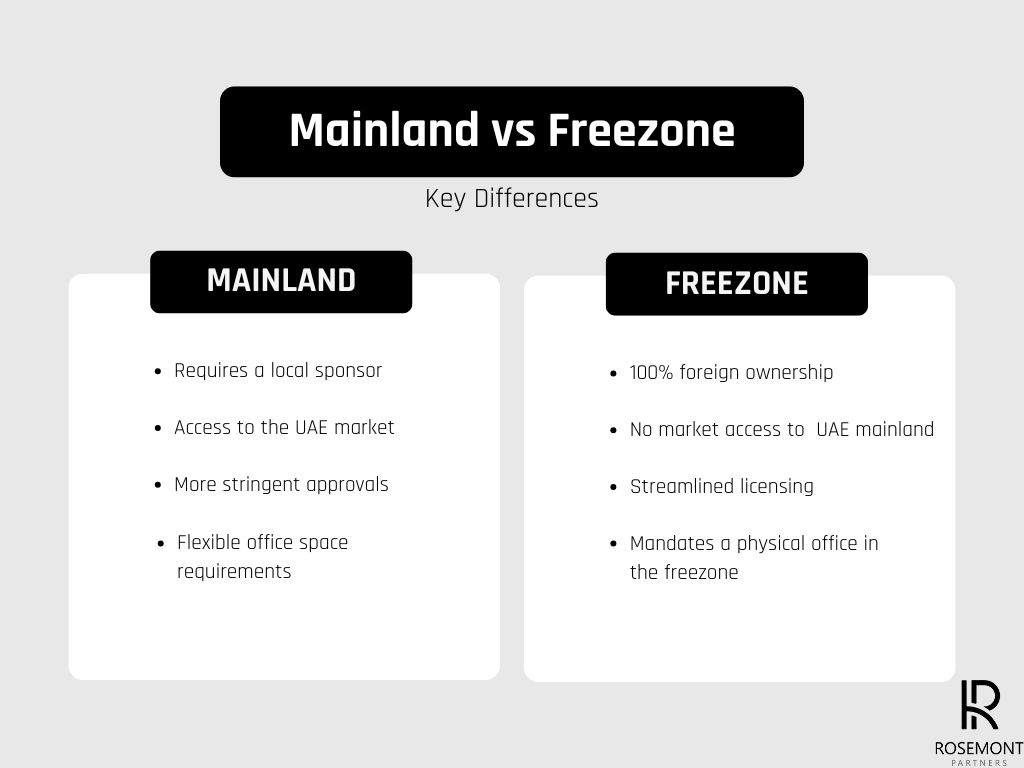Setting up a business in the UAE can be a game-changer for entrepreneurs. With a booming economy and strategic location, you have two main options: mainland and freezone. Each offers unique advantages that can significantly impact your business’s success and operations.
Choosing between these setups requires careful consideration of your goals and needs. Mainland businesses allow you to operate across the UAE and tap into the local market. Understanding the differences can help you make an informed decision that aligns with your vision.
Mainland Business Setup
Setting up a mainland business in the UAE offers unique opportunities and challenges. Understanding both aspects ensures you can make informed decisions tailored to your business goals.
Advantages of Mainland Business Setup
- Access to Local Market: Mainland businesses can operate throughout the UAE, accessing diverse clientele and customers without restrictions.
- No Limitations on Business Activities: You can engage in various commercial and industrial activities, enabling broader operational flexibility.
- 100% Staff Hiring Flexibility: No restrictions exist on hiring foreign employees, allowing you to select talent from a global pool.
- Business Partnerships: You can form partnerships with local companies, increasing your networking potential and business reach.
- Increased Credibility: Operating under the UAE government’s jurisdiction enhances your business’s credibility, which can attract more clients and customers.
Freezone Business Setup
Freezone business setups in the UAE offer specific advantages tailored for foreign investors. Understanding these benefits and challenges helps you decide which option aligns best with your business strategy.
Advantages of Freezone Business Setup
- 100% Foreign Ownership: You retain full control of your business without needing a local partner.
- Business Support Services: Free Zones offer streamlined services, including licensing and registration, which simplify the setup process.
- Sector-Specific Zones: Many Free Zones specialise in particular industries, giving you access to tailored resources and networking opportunities.
- No Currency Restrictions: You can transfer funds freely, facilitating international trade and business transactions.
- Limited Market Access: You cannot conduct business directly with the UAE mainland market, restricting potential customer reach.
- Regulatory Compliance: Certain operational restrictions apply, necessitating adherence to specific regulations within the Freezone.
- Office Space Requirements: Freezone setups often mandate physical office space, which may involve additional costs.
- Dependency on Freezone Regulations: Changes in Freezone regulations can impact your business operations, introducing an element of risk.
- Restricted Business Activities: Some Freezones limit the types of business activities you can engage in, potentially restricting growth opportunities.
Key Differences Between Mainland and Freezone
Understanding the key differences between mainland and Freezone business setups in the UAE helps you make informed choices for your entrepreneurial journey.

Ownership Structure
- Mainland: Requires a local sponsor for foreign ownership, typically holding 51% of the business shares.
- Freezone: Allows 100% foreign ownership without the need for a local partner.
Market Access
- Mainland: Provides full access to the UAE local market and the ability to trade directly with customers across the region.
- Freezone: Restricts market access to the UAE mainland, with trading primarily limited to the Freezone and international markets.
Licensing and Regulations
- Mainland: Involves more stringent approvals, requiring licenses that align with local laws to carry out specific services.
- Freezone: Provides streamlined licensing processes tailored for specific industries, often designed to facilitate business setup. Certain activities may require additional approvals, regulated approvals and/ or Letters of Undertaking.
Office Space Requirements
- Mainland: May impose flexible office space requirements, allowing businesses to operate from various locations.
- Freezone: Typically mandates a physical office in the freezone, with specific size and operational guidelines. However it is very common to utilise a flexi- desk option until you need to upgrade your registered address to a dedicated office space.
By considering these differences, you can better evaluate which business setup aligns with your objectives and operational strategies in the UAE.
Conclusion
Choosing between a mainland and Freezone business setup in the UAE is a pivotal decision for your entrepreneurial journey. It’s essential to weigh the benefits and challenges of each option against your specific goals and operational needs. Ultimately, aligning your business setup with your vision will pave the way for success in the dynamic UAE market. Take the time to evaluate your priorities and consult with experts if needed. Your business’s future depends on this crucial decision.

